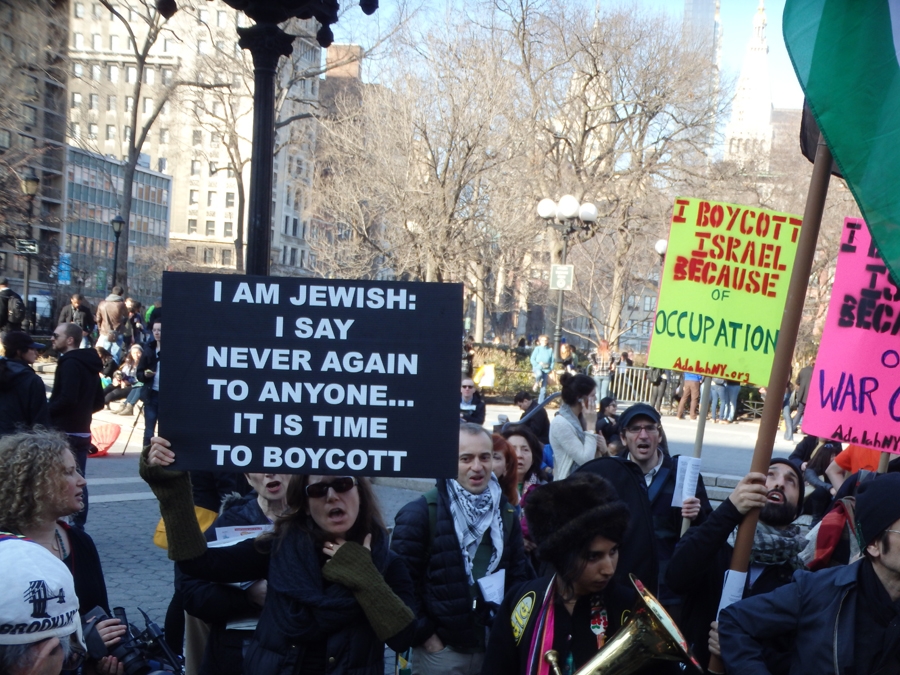It’s July in the office, and I get an email from an artist, an artist whose work I’ve always thought is great. In his email, however, this artist is inviting me to sign up to a pledge for a cultural boycott of Israel, in support of ‘the Palestinian struggle for freedom, justice and equality’. Signatories pledge ‘to accept neither professional invitations to Israel, nor funding from any institution linked to its government until it complies with international law and universal principles of human rights’. Some of the signatories are also among those who, a few days before, sign an open letter calling for an arms embargo against Israel.
As Israel’s wretched military campaign against Hamas rocket attacks and tunnel incursions drags on into August, as images of dead and wounded Palestinians become a fixture of daily news bulletins, the demands for cultural boycotts of Israel – which have been simmering in one form or another for the last decade – have started to pick up momentum among artists and arts professionals in the UK. Israeli-funded theatre and dance companies presenting at the Edinburgh Festival are subject to calls that they be banned from performing. The issue reaches a sort of unquestionable us-or-them hysteria, in which questioning the good sense of boycotts, cultural or otherwise, puts you automatically on the side of the bad guys.
It’s hard to decide what is worst about the idea of a cultural boycott, whether against Israel or not. Is it that there’s something inherently repugnant about artists and intellectuals – a demographic you might think was more committed than most to openness, freedom of expression and internationalism – trying to close down the artistic freedom of their peers, in order to make a political gesture of disapproval towards a government and its policies that – if one listens to Israeli artists living in the UK and elsewhere – many Israelis disagree with already? Or is it that in campaigning for what is essentially a form of censorship, those calls for a cultural boycott contribute, unwittingly, to the now-familiar process of demonisation of those states that we ‘over here’ disapprove of? Is it that in their obsessive focus on a particular country and its actions, campaigners for boycotts effectively reinforce the sense of moral superiority that always seems to attach to ‘us’ here in the West over ‘them’ over there, wherever it is, in the East?
So far, no artist or writer I know has called for cultural boycotts of the US or UK or EU. It would be funny, wouldn’t it? Boycott Jeff Koons for the policies of the Obama administration, for the still open Guantánamo Bay and never-ending drone strikes? Boycott Damien Hirst for the policies of David Cameron, or Gerhard Richter for the policies of Angela Merkel or the EU?
And where should it end? Should Israelis living here be denied opportunities to work and exhibit? Or just anyone who happens to support Israel?
And where should it end? Should Israelis living here be denied opportunities to work and exhibit? Or just anyone who happens to support Israel? (Making exception, of course, for those ‘good’ artists and intellectuals who agree with us?) Or maybe ‘we’ should start ‘outing’ those artworld interests who have ties to the state of Israel?
Perhaps the most dismal aspect of the call to boycotts is how complicit these campaigners have become (whether they realise it or not) with the mood-music of condemnation that flows from mainstream politicians. Left-wingers used to be against the military and political machinations of Western governments; now they seem only to contribute to encouraging Western governments to ‘do something’, to make things better, when all the evidence of the last decade – see Afghanistan, Iraq, Pakistan, Libya, Syria and on, and on – shows what a disaster this has been. From once being opposed to the political powers of the West, those on what we now call the left have become nothing more than naive cheerleaders for Western meddling in conflicts around the globe.
Back in 1972, the British leftwing art critic and writer John Berger won the Booker Prize for his novel G. He declared that he was giving half the prize money to the radical African-American movement the Black Panthers. Today Berger calls on Western governments to impose an arms embargo on Israel – or in other words, to chastise and manipulate a country now judged by the West a ‘rogue state’. From sticking two fingers up at the Man, Berger now holds his hand…
Tie art to politics and it becomes a weapon. Then your only choice remains who you turn it against. It is a choice we should refuse to make.
This article was first published in the September 2014 issue.
